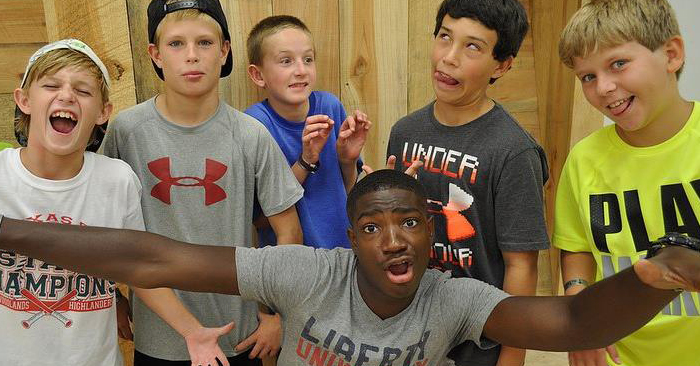Tips for Leading Middle School Small Groups

DOWNLOAD THE PDF OF THIS BLOG POST
Written by Aaron Meservey
When my wife and I began to let our oldest daughter feed herself we had two options: try to keep her relatively clean and get frustrated by the constant mess or learn to accept the process.
While the latter is clearly the right answer, I tried the former for many long months followed by anger, outbursts, and frustration.
She wanted to play instead of eating, or grab a handful of mashed potatoes, while going through the motions of “Head, Shoulders, Knees and Toes.”
Covering herself in food became a nightly routine.
Our dog gained 15 pounds from dropped food.
Our table constantly felt sticky and the impulse to make her eat like a “big girl” was strong.
While we certainly had certain rules to follow to help reduce some of her immaturity, the real shift in the dining experience came with accepting that the mess will happen.
Leading middle school small groups is like that.
Our students will want to play instead of being fed and conversations that we have nicely planned may become a messy experience due to rabbit trails of whatever they’re thinking about at the moment.
If you are set on keeping everything organized, neat and clean it will be unending frustration as you try to wrangle students to get through material.
Of course we’ll never abandon small groups because on good days, we realize how effective small groups are at building community, going deep, and inspiring application.
But on those bad days, it can be some of the hardest and most frustrating work we do.
Unfortunately, I don’t think there’s a surefire way to make leading a clean process, but you have to learn to accept the craziness as part of the process.
While trying to eliminate mess will drive you mad, you have the ability to limit it and sometimes even use it to your advantage.
Just like with the self-feeding toddler, your job at the moment isn’t to keep the area clean, but to get the child fed.
Below you’ll a few tips that will hopefully help you to keep the mess to the level where there’s still some food left to eat.
PRAYER
Yes, prayer matters.
I don’t mean a generic prayer but real, deep intercessory prayer for the time that you and your team will be ministering.
While prayer can at times be hard, it is the most important thing we do in preparation as we invite Jesus-the Chief Shepherd to be at work.
The God who can still the stormy seas can also still restless middle schoolers, though the former at times seems easier.
You will never say, “I wish I had spent less time praying and more time studying for my message.”
When you try to teach, preach, and lead small groups without real prayer, students seem less focused, have a harder time applying truths, and you may not feel as sharp as a teacher.
PHONES AWAY
When I first became a youth pastor, I didn’t bother to get rid of phones.
I wanted to appear relaxed and down to earth.
I didn’t want to stretch students too far and wanted to give them the opportunity to use their phones appropriately: Bible app, take notes, etc.
Two things completely transformed my approach.
First, I read some of the science about how the mere presence of a phone distracts people from one another, decreases conversational quality and empathy for others.
Community, relationships, and conversations, the very things small groups are designed to facilitate, are being undermined.
Phones can be an addiction, which means even if you’re a great leader/speaker, its presence will be distracting their minds.
Second, I realized how much phones affect me.
I was intentionally a late adapter to the smartphone, but when I finally gave in I noticed how my own compulsion to grab my phone to check emails, texts, social media would distract me from family time.
If it distracts you and I, it will most likely distract junior highers.
The other day, one student was pleading to hold onto his phone.
“I just want to be able to check the time” he repeated over and over and over.
…there was a wall clock right next to him.
The perceived need to have their phone reveals the actual need not to have their phone.
Every week before we get started, I let them know that because this particular time is sacred, we put our phones away as a gift to God and to one another.
While some resist, for many it has become a refreshing ritual where they can escape the tyranny of constant connection for an hour.
Even if they truly are intending to use their phones to only take notes, read the Bible, or check the time, its presence transforms the dynamic of the room.
Experiment for a month and see how students engage differently.
CONVERSATIONAL JUDO
When a student goes on a random tangent, my initial reaction is to get the conversation away from the tangent as quickly as possible, but I’ve come to try to employ what I call “conversational judo.”
Judo, like many other martial arts uses the other person’s force against them.
It allows a petite woman to be able to throw a big, hulking man, whom she probably couldn’t even lift if he was stationary.
His own momentum, not her force, is used to send him hurling through the air.
Junior high students have minds that often make bizarre connections that have nothing to do with the topic.
These tangents, for which junior highers are so prone to having, are like the big hulking man attacking the defenseless conversation.
Conversational judo lets you take the bizarreness of the comment to create a powerful object lesson.
For example, last night I was talking with students about how God gives people a vision to join his mission to reach the world.
Hearing the word mission caused one student, whose dad is a helicopter pilot for the Coast Guard, to recall a mission his dad went on where they came across a guy who wouldn’t leave his boat in a bad storm and washed up dead on shore a couple days later.
Conversational Judo takes the random story and explains how many people in the world are in severe danger but they’re so concerned in holding onto their stuff that the reject the salvation brought by the gospel.
God calls us to go offer his salvation, but we can’t make someone leave their boat.
Molding the story that had little to do with the conversation into an illustration gave the group (and especially that student) a new understanding of our role when we evangelize.
Yes, at times your responses will be forced or awkward, but junior highers rarely notice and it’s way more helpful at getting students to learn.
While my reaction to the bizarre wanderings of the pre-teen mind is to shut it down and reset the conversation, learning to pause and ask myself “How can I use this?” has helped to funnel the random asides into constructive portions.
Students then feel that they’re really contributing to what’s happening and they become more engaged.
RECAP QUESTIONS
In my context, our boys’ small groups meet after a large group teaching and not as its own event.
When I teach high schoolers, I am pretty confident that they have heard, understood, and retained the main point of the message.
For them, I am often able to jump right into application.
Middle schoolers are a different breed.
Even when I feel that I’m at my best teaching, and most of the students are tracking, there is almost always one or two who have zoned out.
Stress, pressures, or just an overactive imagination have kept them from fully getting what’s going on.
What I’ve begun to do more of is ask general recap questions that make sure they are still with me.
It also allows one student to explain it to another, which further solidifies the story and teaching in their minds.
When students have missed the content, it’s much harder to focus on the conversation.
Very briefly going over the main points and story arc helps the middle-schoolers engage.
BONUS TIPS: LET BOYS BE BOYS
While this phrase can be used to suggest that we should tolerate crude behavior or comments from boys, I intend it only to suggest that we recognize how boys relate differently than girls.
Girls often bond to one another if they are able to “share their heart” and so small groups work naturally into their strengths.
Boys (typically) bond through competition and activity.
My wife and I serve as resident directors at a college and every year my wife places roommates together.
While there are a couple exceptions, we’ve learned that when girl teammates are put together things generally end poorly.
Since our girls volleyball team arrives early, many of their first relationships as freshman are with their teammates.
They often asked to be moved to room with their newfound friend, which almost inevitably ends in disaster.
However, males almost always end up rooming with their teammates.
When guys compete with one another, it forges deep friendships.
When boys come to rely and depend on another in competition, it suggests to them they can depend on them for other things.
While our female small groups will begin with talking, conversing, and catching up, our boy groups will begin with a team game or activity.
Depending on your particular group, you can grow together through board games, athletics, or even taking little adventures/field trips around the building.
CLOSING THOUGHTS
One of my favorite proverbs is “Where there are no oxen, the manger is clean, but abundant crops comes by the strength of the ox.” (Proverbs 14:4, ESV)
For most of the year, a farmer will be feed an ox spending a lot of time, energy and resources keeping the manger full, without any fruit from it.
Perhaps this reminds you of your middle school small group, where you are putting a lot into it without seeing the fruit.
Know that as surely as the ox helps bring abundant crops, your energies into your small group will reap an abundant harvest.
It will often be messy, crazy, and at times frustrating, but it will always be worth it.
DOWNLOAD THE PDF OF THIS BLOG POST
Aaron Meservey is the Pastor of Student Ministries at Elizabeth City Evangelical Methodist Church in North Carolina. He’s married to a beautiful wife, Liz, and has two daughters: Eden and Chara.


2 Replies to “Tips for Leading Middle School Small Groups”
Aaron Brackney
Great article! I am going to share this with my volunteer staff at our next leader meeting.
Tara Phillips
Love this! We just began splitting our Jr. High and High Schoolers last week and I could use all the help out there for our middle Schoolers and us leaders.
Comments are closed.